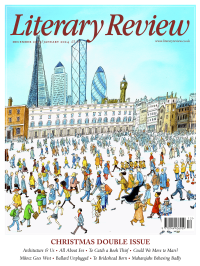Nicholas Stargardt
Everyday Stories of Genocide
Bystander Society: Conformity and Complicity in Nazi Germany and the Holocaust
By Mary Fulbrook
Oxford University Press 448pp £26.99
On 23 July 1944, the Soviet 2nd Tank Army stumbled on a fully intact death camp on the outskirts of Lublin. Alongside the SS and prisoner barracks, three gas chambers, a crematorium and trenches for mass executions, they found the detritus of mass murder: piles of clothing and mounds of human hair. Aware of the unparalleled significance of what they had found, the Soviets invited foreign journalists to bear witness. The first images and film footage of the Majdanek camp were transmitted around the world while the gas chambers of Auschwitz-Birkenau were still operating at full capacity. Ever since those first images were transmitted, people have been asking the same baffled questions about what kind of society could do such things. These questions lie at the heart of Mary Fulbrook’s brilliant new book.
Fulbrook brings a lifetime of scholarship and reflection, as well as a fearless courage, to the task. She is interested in individuals, both as actors and as witnesses. Above all, she is concerned with how and why they perceived things the way they did, and with piecing together the huge

Sign Up to our newsletter
Receive free articles, highlights from the archive, news, details of prizes, and much more.@Lit_Review
Follow Literary Review on Twitter
Twitter Feed
‘The Second World War was won in Oxford. Discuss.’
@RankinNick gives the question his best shot.
Nicholas Rankin - We Shall Fight in the Buttery
Nicholas Rankin: We Shall Fight in the Buttery - Oxford’s War 1939–1945 by Ashley Jackson
literaryreview.co.uk
For the first time, all of Sylvia Plath’s surviving prose, a massive body of stories, articles, reviews and letters, has been gathered together in a single volume.
@FionaRSampson sifts it for evidence of how the young Sylvia became Sylvia Plath.
Fiona Sampson - Changed in a Minute
Fiona Sampson: Changed in a Minute - The Collected Prose of Sylvia Plath by Peter K Steinberg (ed)
literaryreview.co.uk
The ruling class has lost its sprezzatura.
On porky rolodexes and the persistence of elite reproduction, for the @Lit_Review: